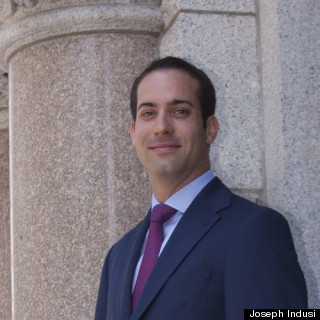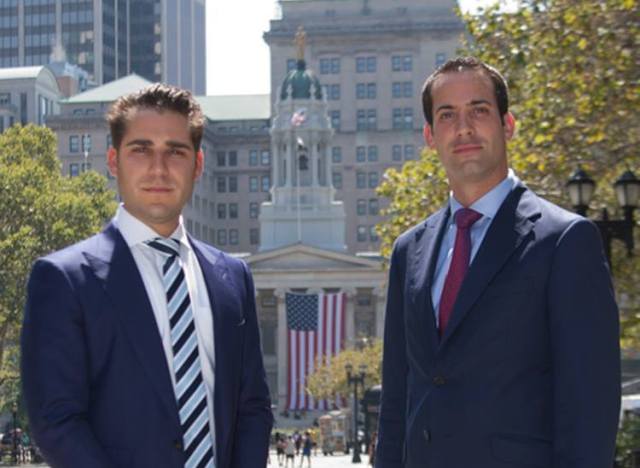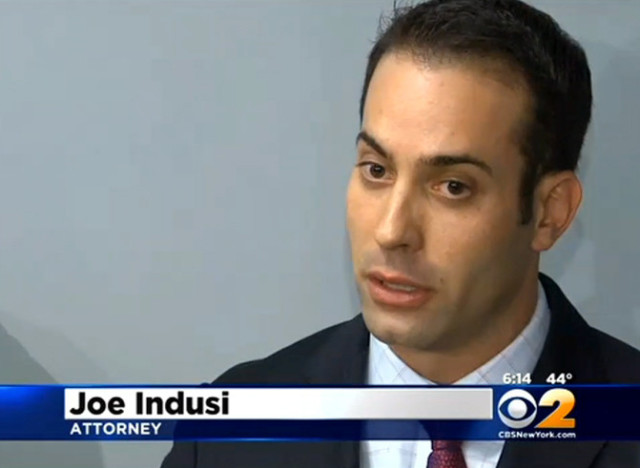Do you ever dream of quitting your job, throwing caution to the wind and beginning a business venture of your own?
Aside from the whole 'throwing caution to the wind' thing, that's essentially what small business owners do when building an enterprise from the ground up. That and, well, embarking on a grueling and extremely difficult journey to create something profitable out of almost nothing.
To highlight the trials and tribulations of being at the head of a new company, we've partnered with Intuit, makers of QuickBooks, to speak with small business owners from a variety of different fields -- including law, retail and professional services -- for their take on getting started, overcoming obstacles and facing challenges along the road to success.

First up, we have Joseph Indusi from London Indusi LLP, a full-service criminal and civil litigation law firm with offices in Manhattan and Brooklyn as well as Nassau and Suffolk counties.
Along with partner Cary London, Indusi officially opened doors for business in October of 2014. Already, the partners have an impressive resume of clients with successful outcomes, including dropped assault charges for the defendant in the NYC-infamous 'Subway Slapper' case.
HP: Why did you decide to start your own business?
Before opening, my business partner [Cary London] and I worked at Brooklyn Defender Services (BDS). It was a great job. We both got great experience and litigated many, many cases ... But when you're a public defender, you can't take on just any case, or step in if a friend-of-a-friend gets locked up. You can't appeal an interesting legal issue. Instead, you're assigned cases.
... The opportunity to broaden our horizons and practice in many areas -- like negligence -- were very satisfying. The idea of taking a walk-in case, like a business issue or dispute, or that we could get justice for a person who was seriously injured in a car accident or medical malpractice, also was very satisfying. So we wanted to leave BDS after we got that litigation experience and start our own business where we could pick and choose cases we wanted to get involved in, as well as cases we wanted to pass on.
HP: What were some of the risks involved when you decided to start your own business?
The risks were that we both left [steady jobs at] BDS. We left on good terms. When we went to our executive director's office to tell her we were leaving, she said, "I knew this would be coming sooner or later." There's always business risks, but if you think too hard about the risks, you'll never do anything new or different ... Realistically, you have to gamble on something or you'll never go anywhere. We love the people [at BDS], we loved the place, we loved the work -- you have to take what you learn and go out and use it.

(Indusi, right, with business partner Cary London, left)
HP: What would you say was the hardest part of starting your own business? What is the hardest part now?
I think the hardest part was leaving the old gig -- actually mustering up the strength to leave. There's certainly some struggle because you're not just doing legal work, you're starting a business. That means advertising, networking and completing applications. You need insurance, computers, a fax machine and your telephone and email set up. If you have no phone, you have no clients. Once you're up and running, you're running: That means business work, legal work and maintenance of a business.
HP: Is there one mistake you have made along the way that taught you something about your business, or taught you an important lesson about running a business?
Fortunately, we have a lot of people in the legal community that we are able to speak to, who are able to be of great assistance in running the business, so on that end we're very fortunate. Thanks to their advice, we think we avoided many rookie mistakes ... The best lesson we learned at BDS is knowing your case inside and out so you're not stuck with a case that, after spending a lot of money, you realize there is no case.
HP: What are some of the unique and/or unexpected challenges you've faced along the way?
[At our previous job], we had great paralegals and a great support staff. I could drop a letter on their desk and the next day it'd be typed, printed and mailed. At the beginning [of our business], we didn't have a mail machine and spent hours going to the post office -- those are things we took for granted at our previous job.
HP: What advice do you have for others looking to venture out on their own?
I would say that anyone thinking of having their own practice should make sure they have those people in their lives that they can pick up the phone and call for their expertise. To have people we can call that practice in various areas of the law, family law, criminal law, personal injury and real estate. That's really invaluable ... And not just having lawyers to consult, but CPAs that can assist you in making business decisions.
Prepare to be busy and work weekends. I like being busy -- I don't like to sit around. Most weekends, we're working. We work Monday to Friday, and some Saturdays and Sundays. [On weekends] you don't have the phone volume, so you have quiet time to do the legal work.

(Indusi speaking about representing the 'Subway Slapper' case on CBS New York)
HP: What has been the most surprising thing you've learned since starting your own business?
There's a lot of surprising things. Sometimes the phone rings, and you think you're having an office day. The next thing you know, you're running to three different boroughs to do three different arraignments. It's surprising, but it makes us very happy.
HP: What is your favorite part (or favorite parts) of owning your own business?
I enjoy being my own boss -- my partner does, too. We work very well together, playing off our strengths and weaknesses. We get great results for our clients and motivate each other. We're able to take on a variety of legal issues while focusing on criminal work, like insurance fraud, driving while intoxicated and personal injury. At the end of the day, it's great. We love the law, we respect our clients, and we're able to get them justice, whether it be money or [allowing clients] to see their kids. It's rewarding to be the partners of a law firm getting great results for clients.
HP: What are the most important qualities you think a small business owner should posses?
I think the ability to manage time, the ability to take risks and the ability to hustle [are all important]. When the phone rings, you need to be able to go. We've been able to help a lot of people and take in a lot of new clients by being available at the drop of a dime. When the phone rings at 10 p.m. on Christmas Eve, we're ready to go -- we're ready to drive out to Nassau County, the Hamptons, or do whatever it takes.
If you're not willing to drop everything and hustle, I think that can hurt a small business owner. I was told at a very young age that if there's an opportunity in front of you, it's not about that opportunity -- it's about what you do with that opportunity. If you leave it hanging because you're tired, or don't want to go out in the cold, that could be a mistake. That could be the one client that can give you another 15 clients. Seize that opportunity, and do not let those opportunities pass you.
Intuit QuickBooks provides small business owners cloud-based tools to run and grow their business. From creating invoices and paying bills, to managing payroll and monitoring expenses, QuickBooks is the operating system that supports small business.